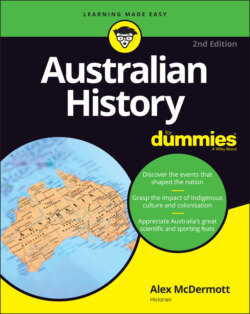Читать книгу Australian History For Dummies - Alex McDermott - Страница 100
Converting Macquarie
ОглавлениеAfter Bligh, and because of the bad press circulating from various disgruntled Evangelical Christians and people of influence (refer to Chapter 4), Macquarie arrived in NSW fully expecting a crime-ridden, chronically inebriated nightmare hellhole. Instead, he found a social experiment that had been bubbling along for some 20 years. Starting out with the maligned ‘dregs’ of British society, the unplanned experiment seemed to show that if you took even criminals and misfits and gave them
A chance to start again
In a new place entirely
With plenty of chances to get ahead
Lo and behold, people often did succeed.
Since 1788, the feckless, the jobless, the impulsive and just plain foolish, not to mention the cunning and nasty, had been extracted from their usual habitations and haunts and used to begin a new society. Remarkably quickly, they filled out practically all the social and economic niches of 18th-century Britain that were available for the taking in a new world. By the time Macquarie arrived, ex-convicts were landholders, farmers, traders, tradesmen, retailers, ship owners, manufacturers and professionals such as doctors and lawyers.
One ship’s captain, reporting back to Sir Joseph Banks with some contempt on the improved situations of two ex-convict businessmen, stated: ‘I am informed they each have handsome houses at Sydney, keep their gig [carriage], with saddle horses for themselves and friends, have two sorts of Wine, and that of the best quality on their Tables at Dinner …’ Banks may have despised this but Macquarie thought it was wonderful.
As well as the very successful, there was everyone else — the skilled and unskilled labourers, the servants, the publicans and innkeepers, the dozens of professionals, clerks and administrators, the jailers and constables. Many of them, from top to bottom, were the classic ‘lower orders’, who in Britain had comprised the bulk of the soldiers and the criminal classes. Out here in the colony, they were filling practically every social role and occupation (including, of course, the drunks and repeat offenders — but these hard cases Macquarie didn’t mention quite so often). All in all, the social and economic world of Sydney and its hinterland, and soon enough in Van Diemen’s Land also, was starting to take robust shape.
Macquarie’s stroke of genius was to recognise this world order and seize upon it — not try to turn it back to what the original planners or current ministers in London expected, insisted or wanted it to be. Instead, he chose to fast-track it. He recognised the positive outcomes of this (accidental) social experiment, and began to champion it.
Early on in his governorship, Macquarie decided that the convicts, ex-convicts and others who were making a go of it in NSW weren’t the problem — they were the purpose of the place. Rather than treat the colony as simply an outpost of Britain’s imperial will, he began to see it from the convicted criminals’ point of view. The colony was a land of opportunity for the people living there, and it should be governed with their interests in mind. With a policy of part goodhearted benevolent patron, part authoritarian despot, he endeavoured to make sure that generations of convicts’ descendants who came afterwards would remember him warmly.
This went against express instructions from the Colonial Office and general British opinion.
